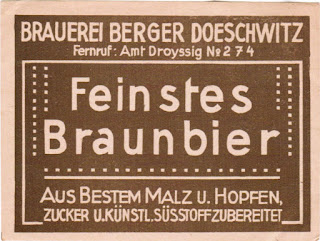By 1845, Lager (in the quotes called "Bavarian beer") was already popular in Berlin and breweries had been set up to produce it in the Prussian capital.
"It is absolutely and undeniably certain that the brewing of beer is a chemical process of such robustness that one can always produce the same product with the same material. This truth and the importance of the established scientific rules are well known in England and Bavaria, and all breweries of some importance are subject to them. On the other hand, in Prussia, where distilling has risen so completely on the basis of chemistry, brewing has still been carried on in a sorry and careless manner. This alone is the reason why we have not, so far, despite all the attempts made, been able to produce Bavarian beer - which is so universally valued for its advantages - which is the equal, either in terms of taste and quality, or in terms of durability, strength and price, of that from Bavaria. Many Bavarian breweries were established in Berlin and elsewhere; but they are far from doing the right thing. Every admirer knows how to distinguish genuine Bavarian beer from Berlin, so that the latter begins to fall more and more into discredit and many an entrepreneur is threatened with his downfall if he does not decide to accept those basic kegs. So it is with imitation English beers. Instead of sticking to the point, people think they can produce the same product by using all sorts of additives, to which they never resort in England, but results shows how badly they were mistaken."
"Handbuch der praktischen Bierbrauerei" by Dr. Julius Ludwig Gumbinner, 1845, pages 128 - 129.
I wonder why they couldn't get Lager right in Berlin? Was it the brewing process? The ingredients? Lagering? It's impossible to say without more details.
What were the additives used to mimic English beers? Obviously, English brewers couldn't use the. Not unless they fancied a spell in jail. I'm guessing that English beers had arrived in Berlin before those from Bavaria.
The new-fangled beer from Bavaria was, like any invasive species, already driving natives to extinction:
"It will therefore do you good to look around for the means that can help the art of brewing, which has fallen so much in northern Germany. Foreign beverages have supplanted older domestic products because they taste better and in some cases are healthier, when the price has not been taken into account. Many types have disappeared completely, others are only in very insignificant demand, and if you want to exclude Berliner Weissbier, for example, its conspicuous peculiarity assigns it an independent position, Bavarian beer has triumphed over all others. From this it is clear that one must focus on its production and in such a way that one produces a cheap domestic product for the masses of the people who, because of the high price, have until now only had to rely on imitations. Some of the material used for these imitations is just as good as in Bavaria; and it can only be due to the company and the lagering if an equally good product does not come to light."
"Handbuch der praktischen Bierbrauerei" by Dr. Julius Ludwig Gumbinner, 1845, page 132.
Ironic that Berliner Weisse is mentioned as an exception to the slumping popularity of older styles. Given its now very tenuous existence.












































































3 comments:
I haven't seen Gratzer/Grodziskie described as a Rauchbier before. I thought that term was only used for Franconian beers.
I suspect that it was water chemistry, which wasn’t well understood until much later in the century.
It depends what language you’re speaking. Grodziskie is a smoked beer, which is of course exactly what Rauchbier means, so naturally you would find it described as Rauchbier in German texts.
I wouldn’t call it Rauchbier in English.
Post a Comment